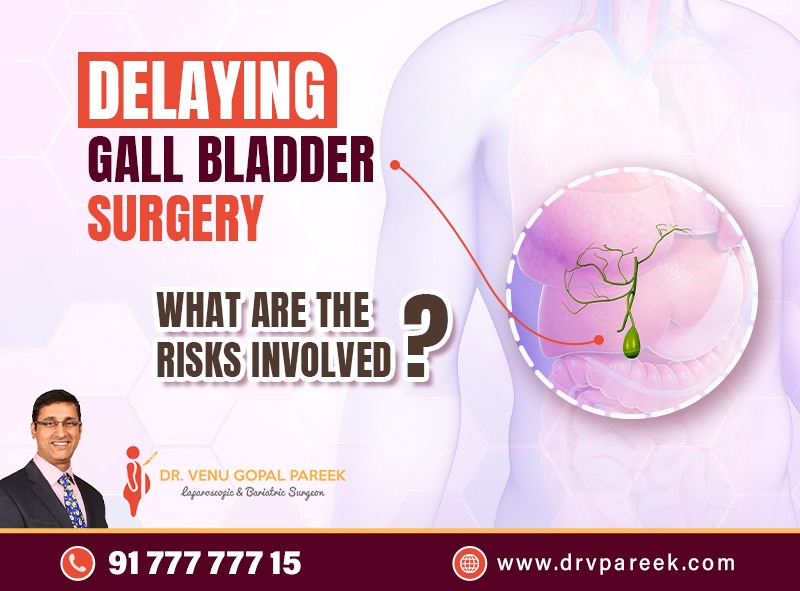
The gallbladder is one of the most important organs in the body that helps to store bile which is produced by the liver. This bile juice is a vital component for digestion, assisting in the breakdown of fat into fatty acids. As a result, the body is able to eliminate waste that it doesn’t need while effectively absorbing the nutrients it needs.
The gallbladder is located close to the liver and pancreas. It is a small organ with a small pouch that fills with bile juice before a meal and is released in the body, into the small intestine via bile ducts when triggered by hormones. However, removal of the gallbladder won’t have any significant negative effects because it just aids in digestion.
Removal of the gallbladder is not necessary for every patient, Dr V Pareek and his team will discuss whether your problem requires gallbladder surgery. To gain a better understanding of common symptoms and the risks of delaying surgery, schedule a consultation with our experts.
Gallbladder surgery, also known as cholecystectomy, is a common surgical procedure to remove the gallbladder, which is an organ located under the liver that helps in digestion. Gallbladder surgery may be recommended for various reasons, including gallstones, inflammation, infection, or cancer.
Gallbladder surgery
The procedure of Gallbladder Surgery is commonly called as cholecystectomy, which involves the removal of the gallbladder, a small organ located beneath the liver. Gallbladder problems like gallstones, inflammatory conditions, infection, or cancer might require surgery.
Gallbladder surgery can be performed in two different ways: open cholecystectomy and laparoscopic cholecystectomy.
Open cholecystectomy: This procedure involves removing the gallbladder by making a large incision in the abdomen.
Laparoscopic cholecystectomy: This procedure also helps in removing the gallbladder but involves making several small incisions by using a laparoscope.
Nowadays most surgeons suggest Laparoscopic cholecystectomy as a preferred surgical procedure for most patients. It has more benefits compared to the open procedure like less invasive, less pain, minimal scarring and recovery time is also very less.
However, for some patients open cholecystectomy may be more necessary than Laparoscopic cholecystectomy and it depends on their problem.
Patients who have had gallbladder surgery might experience some pain and discomfort for a few days, and they must follow a particular diet recommended by the surgeon for a few weeks to help their system become accustomed to the absence of gallbladder. Most patients recover quickly and return to their regular work within a few days to a week following surgery. Following post-operative instructions is highly important to ensure a safe and successful recovery.
What are the risks of delaying gallbladder surgery?
Delay in gallbladder surgery increases the risk of serious health problems, and in some cases, it can be life-threatening. Some of the possible risks that can be caused by delaying gallbladder surgery are as follows:
Pancreatitis: When the gallstones are stuck in the pancreatic duct, it might block the duct passage and causes pancreatic inflammation. This is a severe condition known as pancreatitis and can become even more complicated if left untreated.
Intestinal obstruction: In some cases, gallstones are formed large enough to block the intestinal tract and it causes symptoms like severe abdominal pain, nausea, or vomiting.
Infection of bile ducts: when the bile ducts are blocked by gallstones, it may result in bile duct infection. This might result in a serious illness known as cholangitis, which requires prompt medical care.
Infection(sepsis): If the damaged gallbladder is not removed it might lead to inflammation and infection which further causes severe complications like fever, chills, and severe abdominal pain. It’s a life-threatening medical emergency that requires prompt treatment.
Jaundice: Postponing gallbladder surgery leads to the accumulation of bile in the body which may result in jaundice. People with gallstones are prone to this condition.
Damage of tissues: The gallbladder can become damaged over time if it is not removed. This can lead to scarring and other complications.
Cancer: Gallbladder cancer is another complication which causes due to the delay in gallbladder surgery. Sometimes this cancer might spread to other organs as well.
The above are risks and complications involved in the delay of gallbladder surgery. Other risks associated with delay in gallbladder surgery include the potential for long-term damage to the gallbladder and an increased risk of requiring emergency surgery.
However, a delay in gallbladder surgery might be essential for some patients, so make sure you discuss the potential benefits and risks with your doctor. For more information related to gallbladder problems or looking for a surgeon who can perform cholecystectomy, consult Dr. V Pareek @+91 91-777-77715 or visit Appointment Booking.







